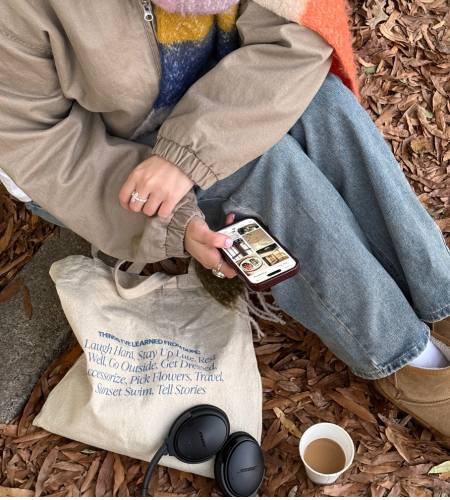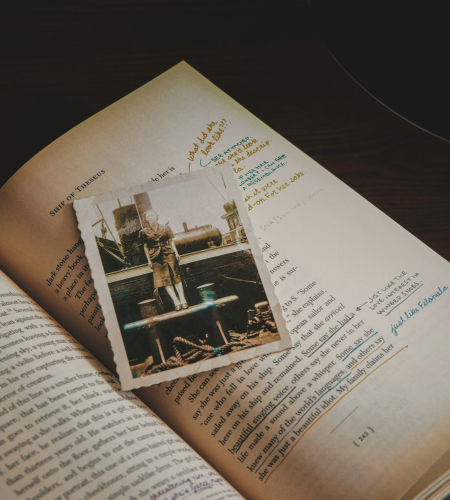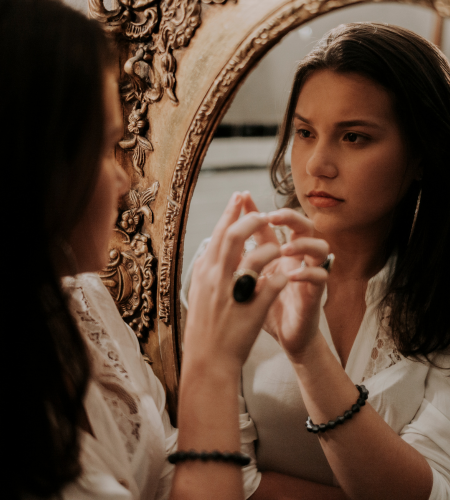
Tired of feeling overwhelmed and anxious? Looking for simple and actionable ways to cope with anxiety attacks? Then, you've come to the right place! This blog post will present 11 quick and easy grounding techniques for anxiety attacks that you can utilize in any situation to feel more secure, centered, and relaxed.
When we're engulfed in the storm of anxiety, it's crucial to find our anchor, and that's precisely what grounding is all about. So let's get started and learn about the different ways grounding techniques can help combat anxious feelings.

What is Grounding?
Anxiety disorders affect more than 40 million adults in the US every year. So if you've been dealing with anxiety, you are not alone.
There are many different routes you can take to manage your anxiety, and grounding is one of them.
We often think of grounding as something only used in physical punishment (like when we were 12 and Mom found out you stayed up until 3am texting your friends).
But grounding, or “grounding techniques”, play an important role in mental health by helping regulate and reduce anxiety. Simply put, grounding is a method to help manage overwhelming feelings or thoughts. When we are feeling overwhelmed or scared, it can be difficult to focus on the present. Grounding is a way to bring your awareness back to the immediate moment, body, and environment.
Imagine grounding as an anchor that keeps you steady when the waves of anxiety threaten to toss you around. It's a set of simple, powerful techniques that bring your focus back to the present moment, away from the swirling worries in your head.
Grounding techniques for anxiety attacks can help us to cope with anxiety attacks by helping us focus our attention away from what is frightening or overwhelming us and onto more calming sensations or thoughts. By bringing our awareness to the present, we can keep ourselves from spiraling into the fear and panic associated with an anxiety attack.
Benefits of Grounding During Anxiety Attacks
There are a number of benefits to using grounding techniques during anxiety attacks. By grounding yourself, you can:
- Feel more in control of your emotions
- Reduce stress and tension by focusing on calming sensations or thoughts
- Increase your ability to focus on the present moment and reduce rumination of past thoughts or traumas
- Get a better sense of your body, environment, and surroundings
- Feel more relaxed and secure in the moment
- Helps reduce the intensity of anxious feelings
- Prevents panic from spiraling out of control
- Boosts your ability to cope with stress

11 Quick and Easy Grounding Techniques for Anxiety Attacks
Progressive Muscle Relaxation
This technique requires tightening each muscle group in the body one by one, starting from the top of your head and working your way down to your toes, and then relaxing each muscle.
Start from your toes and work your way up, tensing and relaxing each muscle group. Feel the tension melt away like sand leaving your body.
This helps you focus on individual muscles, allowing you to take deep breaths and relax each muscle as you go.
Deep Breathing Exercises
Ah, the power of breath!
Deep breathing is a great tool for calming both mind and body during an anxiety attack. Try to take a deep breath in through your nose, hold it for a moment, and then release it slowly through your mouth. Imagine blowing away those anxious clouds with each exhale.
RELATED: 10 Breathing Techniques for Panic Attacks to Calm Yourself Down
Guided Imagery + Visualization Techniques
This involves creating a mental image of yourself in a calming or peaceful place, such as a beach or a meadow.
Create your mental paradise - a tranquil beach, a lush forest, or even a cozy cabin by a crackling fireplace. Close your eyes and immerse yourself in this safe haven, leaving anxiety far behind.
Take some time to imagine the details of this place, including sights, smells, and sounds. Visualizing yourself in a calming environment can help reduce stress and anxiety.
Mindful Meditation
Mindful meditation is the practice of bringing your attention to the present moment without judgment or attachment. This can be done by focusing on your breathing, becoming aware of your body’s sensations, or simply noticing your thoughts and emotions without trying to change or control them.
Embrace each thought without judgment, acknowledging its presence and then letting it float away like a paper boat on a stream.
Aromatherapy
Essential oils, such as lavender, chamomile, and rosemary can be used in diffusers or applied directly onto the skin to reduce stress and anxiety. The aroma of essential oils helps calm the mind by stimulating smell receptors in the nose that interact with the limbic system, which is responsible for emotions and behavior.
Let the scents of lavender, chamomile, or peppermint whisk you away to a calmer state of mind. Inhale those soothing fragrances and exhale your worries while focusing on the present moment.
You can pair this with any of the other techniques.
Emotional Freedom Technique
EFT is hugely beneficial grounding technique for anxiety attacks.
This technique involves tapping on specific acupressure points in the body while repeating positive affirmations to help reduce stress and anxiety. Tapping helps to release any congested energy from parts of the body where stress or tension may be held.
Yoga and Stretching
Practicing yoga or stretching can help to reduce stress and anxiety by focusing on the breath, movement, and mindfulness. Taking a few minutes to practice a few simple poses can help bring your attention back into the present moment and away from worry or fear.
Journaling
Writing down your thoughts and feelings can help reduce stress and anxiety. Taking the time to write down your thoughts can provide clarity and help you process any negative emotions in a healthy way.
Write down your anxieties, fears, and worries, and feel their power diminish as you give them a voice. See if you can pull out the lessons or insights from the stress and anxiety so that you can reframe the emotions into positive ones.
Exercise or Physical Activity
Get those endorphins flowing!
Exercise releases endorphins, which are natural hormones that promote feelings of well-being. Incorporating regular physical activity into your daily routine can help to reduce stress and anxiety.
Whether it's a brisk walk, a dance party in your living room, or some good old-fashioned jumping jacks, moving your body can do wonders for your mind.
Taking a Warm Bath
Take some time for self-care and soak away your stress. Warm baths can help to relax the body and promote feelings of calmness. Add a few drops of essential oils into the bath, such as lavender or chamomile, for an extra calming effect.
Let yourself drift away in a peaceful bubble bath while focusing on your breath and the sounds of the water.
Connect with Nature
Nature, the ultimate healer. (Did you know recent studies have linked nature to symptom relief for anxiety?)
Taking a walk in nature can be very calming and can help reduce stress and anxiety. This is because being outdoors helps to reconnect us with the natural rhythms of life, which can be grounding and invigorating.
Pair a nature walk with mindfulness. Step outside and feel the earth beneath your feet, listen to the birds sing, and breathe in the fresh air to find solace.
Play a Game with Yourself
Focusing on something other than your anxious thoughts can help to bring your attention back to the present moment. Play a game of naming states, dog breeds, cities, or challenge yourself to recite the alphabet backward. The key is to shift your focus from anxiety to fun!


When to Seek Outside Support
Grounding techniques for anxiety attacks can be a great way to reduce stress and anxiety in the moment, but they should not replace therapy or other treatments.
Life isn't always smooth sailing, and it's okay to ask for help when you need it. If anxiety feels like an uninvited guest overstaying its welcome, it might be time to seek some support.
How to Know You Need Support
When anxiety begins to interfere with your daily life, relationships, or work, seeking support is a wise choice. A mental health professional can help you find coping strategies that are tailored to your needs and provide you with further support.
Remember, asking for help is a sign of strength, not weakness.
RELATED: Thinking about Starting Therapy? Here are Some Tips
How Hypnotherapy Can Help with Anxiety
If lifestyle changes and self-care practices aren't enough, it might be time to take a deeper dive into your subconscious.
Hypnotherapy is a powerful tool to explore the root cause of anxiety and address any underlying issues that may be contributing to it. A certified hypnotherapist can help you practice mindful breathing, relaxation techniques, affirmations, and visualization while in a deeply relaxed state.
This can be an effective way to gain insight into any underlying issues that may be causing or exacerbating the anxiety and developing helpful coping strategies for dealing with it.
Take time for yourself and remember that you don't have to do this alone. With the right combination of self-care practices, lifestyle adjustments, and professional support, anxiety can become a thing of the past.
Take some deep breaths and be kind to yourself; you are doing the best that you can. With patience and practice, these techniques will help lead you to a calmer, more relaxed place, leaving anxiety far behind.
Make sure to connect with a qualified professional if you are having difficulty managing your anxiety on your own. They can help provide guidance and support in navigating these tools and techniques for reducing stress and anxiety. And remember, you’re not alone! There is so much strength in asking for help. Reach out today to take the first step towards feeling better.
Conclusion
Grounding techniques for anxiety attacks are incredibly beneficial as they can provide a much-needed sense of safety and control over our emotions. They offer immediate relief, improve coping skills, and bring you back to the present moment when anxiety tries to pull you into the past or future.
Make grounding a habit, like your morning coffee ritual. Practice these techniques even when anxiety is at bay to strengthen your ability to use them during tough times.
By practicing these grounding techniques, you can reduce anxious thoughts and feelings and find calm in the present moment. It’s important to remember that everybody is unique and may respond differently to each technique. Experiment with different methods until you find something that works best for you.
The journey to taming anxiety may have its ups and downs, but remember, you're not alone. Embrace grounding techniques, seek support when needed, and always be kind to yourself along the way.
Would you like to take the first step towards mastering your anxiety and restoring peace of mind?
Download my Peace Maximizer hypnosis audio recording now.
This professionally designed program uses many of the grounding techniques mentioned above, including deep breathing exercises progressive relaxation, guided imagery and visualization, and mindfulness to reduce stress and anxiety.
Don't let anxiety control your life any longer - take back control and start feeling the peace you deserve. Download my Peace Maximizer hypnosis audio recording today!








+ view comments . . .
+
view comments . . .
-